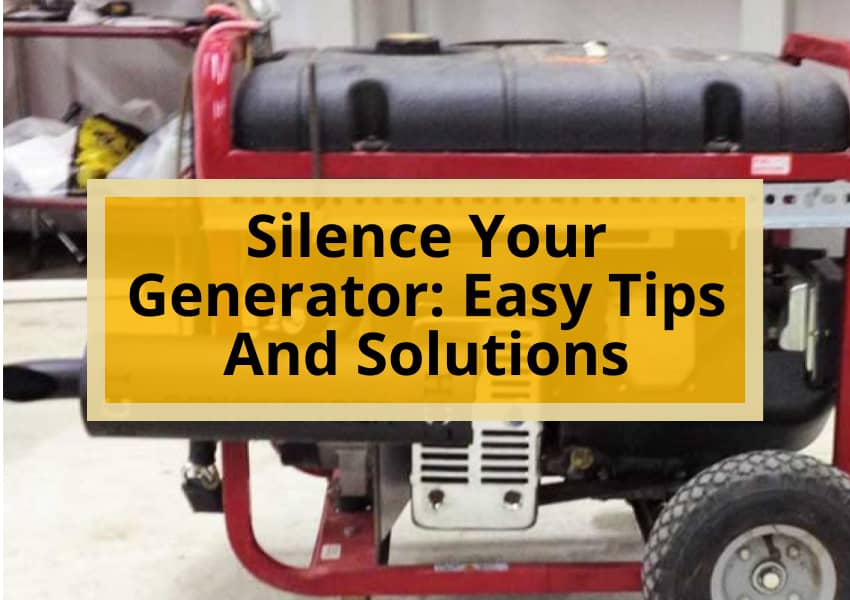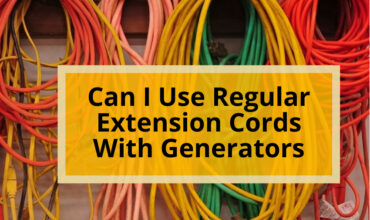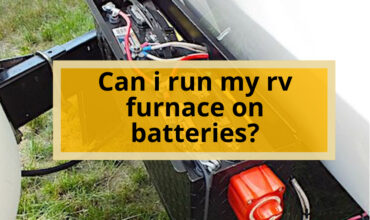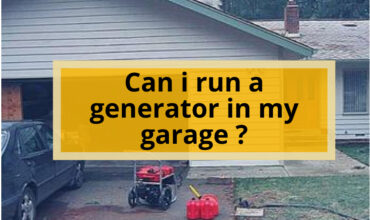Having a generator can be a lifesaver during power outages or when you’re camping in remote areas. However, the noise it produces can be quite annoying, especially if you’re trying to enjoy some peace and quiet. Fortunately, there are several easy tips and solutions to help you silence your generator.
In this article, we’ll show you how to silence your generator with easy tips and solutions. From choosing a quieter model to strategic placement and using sound deflectors, we’ll guide you through the process step by step.
Solutions For Reducing Noise from Generators
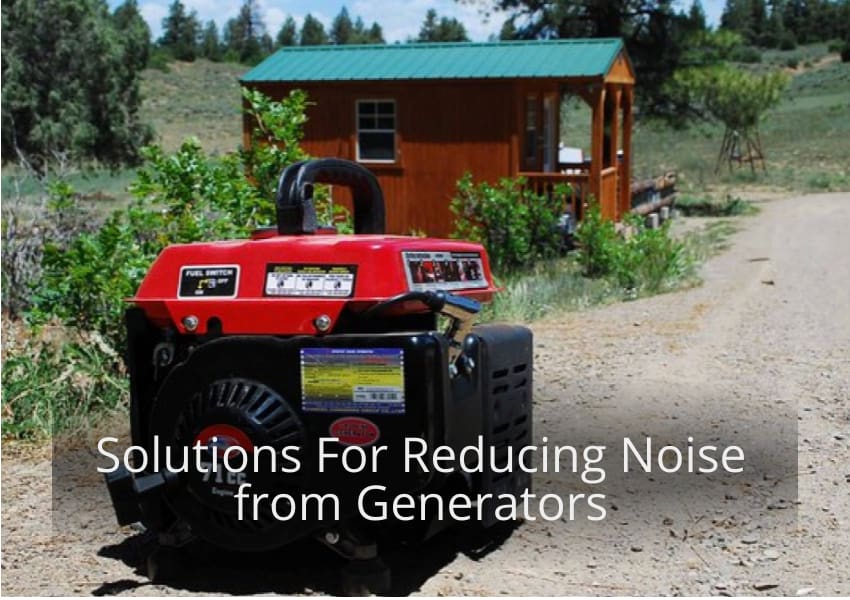
When it comes to reducing noise from your generator, there are several key points to consider.
- Exhaust Pipe Modification
- Enclose The Generator
- Install Rubber or Foam Pads and Put the Generator on A Soft Surface
- A Bucket of Water Placed Near the Generator to Absorb Sound Waves
- Distance
- Replace The Muffler
- Use Sound Deflectors to Create a Noise Barrier
- Time Your Generator Use
- Use A Generator Silencer
- Buy A Generator that Fits Your Need
- Regular Maintenance
1. Exhaust Pipe Modification
To decrease the noise level of your generator, consider modifying the exhaust pipe by pointing it vertically. This simple adjustment can have a significant impact on reducing the noise produced by your generator.
When the exhaust pipe is pointed upwards, the hot air naturally rises, allowing the noise to be directed upwards and away from your immediate surroundings. This modification is an effective and straightforward solution for minimizing the noise generated by your generator.
2. Enclose The Generator
Building an acoustic enclosure around your generator can significantly reduce the noise it produces. An enclosure acts as a barrier to contain and dampen the sound waves generated by the engine.
To build an effective acoustic enclosure, use materials like mass-loaded vinyl or foam panels that are designed to absorb sound. Ensure proper ventilation and airflow within the enclosure to prevent overheating.
By enclosing your generator, you create a designated space that isolates the noise and prevents it from traveling to the surrounding areas. This not only reduces the disturbance to others but also provides a sense of belonging and consideration for your neighbors or fellow campers.
Remember to follow safety guidelines and consult professionals if needed to ensure the enclosure is constructed properly.
3. Install Rubber or Foam Pads and Put the Generator on A Soft Surface
By using rubber or foam pads, you create a barrier that absorbs the vibrations produced by the generator, preventing them from transferring to the ground and causing unnecessary noise.
Additionally, placing the generator on a soft surface, such as grass or dirt, further helps to dampen the noise. These simple solutions can make a significant difference in the noise level of your generator.
These techniques are especially effective when combined with other noise reduction measures, such as using sound deflectors or installing a muffler. So, don’t hesitate to invest in some rubber or foam pads and find a soft surface for your generator to provide a quieter and more enjoyable experience for yourself and those around you.
4. A Bucket of Water Placed Near the Generator to Absorb Sound Waves
By connecting a section of hosepipe from the generator exhaust to a bucket of water, the water acts as a sound-absorbing medium. The exhaust noise is absorbed by the water while allowing gases to escape. It’s important to ensure that the generator exhaust is positioned higher than the water bucket to prevent any backflow.
To further prevent backflow leakage, you can poke a small hole in the hosepipe. However, please exercise caution when using water in proximity to generators to avoid any potential risks.
Using a bucket of water near the generator is a cost-effective and easily accessible solution to dampen noise levels and create a more peaceful environment.
5. Distance
One effective way to reduce generator noise is by moving it at least 20 feet away from your campsite. By increasing the distance between you and the generator, you can significantly decrease the noise level. This is because the sound waves dissipate as they travel through the air, resulting in a quieter operation.
Additionally, placing the generator further away from your campsite also reduces the disturbance it may cause to other campers nearby. Make sure to follow campground regulations and consider the impact on others when determining the placement of your generator.
Using a long generator extension cable can help you achieve the desired distance if needed.
6. Replace The Muffler
The muffler is an essential component of the generator’s exhaust system, responsible for reducing the noise produced by the engine.
By replacing the stock muffler with a quieter one, you can significantly decrease the noise level of your generator. When choosing a quieter muffler, opt for one specifically designed for your generator model to ensure compatibility and optimal performance. Seek the assistance of a specialized mechanic or small engines repairman who can guide you in finding the most suitable muffler for your generator.
With a quieter muffler in place, you can enjoy a more peaceful and harmonious camping experience, fostering a sense of belonging in the tranquil surroundings.
7. Use Sound Deflectors to Create a Noise Barrier
Sound deflectors, made of sturdy plywood, act as a barrier that absorbs and redirects sound waves away from your surroundings.
By strategically placing these deflectors around the generator, you can effectively minimize the noise emitted.
Ensure that the deflectors are positioned in a way that does not negatively impact the generator’s performance or hinder proper ventilation.
By implementing this solution, you will be able to enjoy a quieter generator experience and create a more peaceful environment for yourself and those around you.
8. Time Your Generator Use
Timing your generator use can help minimize noise disruptions for yourself and others around you. By being mindful of when you choose to run your generator, you can ensure a more peaceful environment.
Consider the time of day and the activities of those around you. Avoid running your generator during early morning or late-night hours when people are likely to be sleeping. Plan your generator use around the needs of your household, but also take into account the needs and comfort of your neighbors.
9. Use A Generator Silencer
Using a generator silencer can significantly reduce the noise level of your generator. A generator silencer is a device that attaches to the exhaust pipe of your generator and helps to muffle the noise produced by the engine. It works by redirecting the exhaust gases through a series of chambers and baffles, which absorb and dissipate the sound waves.
The result is a quieter generator that won’t disturb your neighbors or disrupt the peaceful atmosphere of your surroundings. Installing a generator silencer is a simple and effective solution for reducing generator noise, and it allows you to enjoy the benefits of a generator without the loud noise.
10. Buy A Generator that Fits Your Need
When purchasing a generator, make sure you get one that meets your specific power requirements. It is crucial to choose a generator that can handle the electrical load you intend to use. This ensures optimal performance and prevents any potential issues.
Consider factors such as wattage output and the type of generator designed to be quieter, like inverter generators. It is also wise to check customer reviews and ratings for noise levels to make an informed decision.
11. Regular Maintenance
Now that you have purchased a generator that fits your power needs and considered ways to reduce noise, it is important to understand the role of regular maintenance in keeping your generator running smoothly and quietly. Regular maintenance not only ensures the longevity of your generator but also helps to minimize noise levels.
To maintain a quiet generator, you should perform routine tasks such as changing the oil, cleaning the air filter, and inspecting the spark plug. These simple maintenance tasks can prevent excessive engine noise and improve overall performance. Additionally, keep an eye on the fuel level and make sure the generator is properly fueled to avoid any disruptions or noisy operation.
Why Are Generators So Loud?
When it comes to generator noise, several factors contribute to the overall sound level.
1. Engine Noise: Generators are powered by internal combustion engines, which inherently produce noise when running. The combustion process, mechanical parts, and exhaust system all contribute to the engine noise.
2. Vibration: Generators contain moving parts such as pistons, shafts, and gears, which can create vibrations that generate additional noise. These vibrations can be transmitted through the generator’s structure and amplify the overall sound output.
3. Cooling Fans: To prevent overheating, generators often incorporate cooling fans that circulate air around the engine and other components. These fans can generate significant noise as they spin rapidly.
4. Exhaust System: The exhaust system of a generator is designed to expel the combustion gases produced during operation. The high-speed flow of these gases can create noise as they exit the generator.
5. Enclosure Design: Some generators are housed in enclosures or cabinets to reduce noise levels. However, not all generators have advanced noise reduction features, and the enclosure design may not effectively dampen the sound.
It’s important to note that noise levels can vary greatly depending on the generator’s size, type, and quality. Modern generators often incorporate sound-dampening technologies to minimize noise output, but they may still produce noticeable sound, especially at higher power outputs.
Frequently Asked Questions
Why Is It Important to Reduce Noise from Generators?
Reducing noise from generators is important because it helps maintain a peaceful and quiet environment for yourself and others around you. Excessive generator noise can disrupt the tranquility of your surroundings and disturb your neighbors, causing a sense of discomfort and unease.
By taking steps to minimize the noise produced by your generator, you can create a more harmonious atmosphere and foster a sense of belonging within your community. Additionally, reducing generator noise is crucial for preserving the natural beauty of outdoor spaces, as excessive noise can disturb wildlife and disrupt the serenity of the environment.
What Are the Potential Consequences of Not Reducing Noise From Generators?
Not reducing noise from generators can result in disturbing others nearby, violating noise regulations, and causing discomfort to yourself and others. It’s important to minimize noise to maintain a peaceful environment and avoid potential consequences.
Are There Any Regulations or Laws Regarding Generator Noise Levels?
There are regulations and laws regarding generator noise levels. It is important to check your local regulations to ensure your generator complies with noise limits and avoid any potential penalties or complaints from neighbors
Can All Types of Generators Be Made Quieter or Are Some Inherently Louder Than Others?
Some generators are inherently louder than others, but all types can be made quieter with the right techniques. Consider muffler replacements, water muffling, sound deflectors, and acoustic enclosures to reduce noise levels.
What Are Some Additional Tips for Reducing Generator Noise That Are Not Mentioned in the Article?
To reduce generator noise, consider repositioning it, increasing the distance, using rubber feet, muffling with water, employing sound deflectors or an acoustic enclosure. Seek professional assistance for muffler upgrades or silencer installation.
Are There Any Long-Term Effects of Prolonged Exposure to Loud Generator Noise?
Prolonged exposure to loud generator noise can have long-term effects on your hearing, such as hearing loss and tinnitus. Protect your ears with proper hearing protection to avoid these potential risks.
Conclusion
To conclude, reducing noise from generators is essential for a peaceful and enjoyable experience. By considering the wattage output, choosing quieter models, and checking customer reviews, you can find a generator that meets your noise requirements.
Proper placement, using soft surfaces and anti-vibration mats, and employing sound deflectors or enclosures can further dampen noise and vibrations.
Upgrading the muffler or using a silencer, as well as utilizing water as a muffler, are effective solutions.
Implementing these techniques in combination will create a quieter environment, allowing you to fully enjoy your generator without disturbance.
